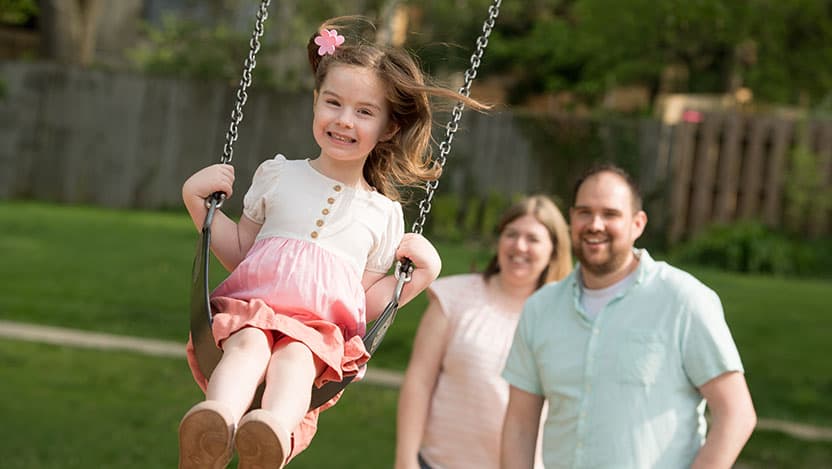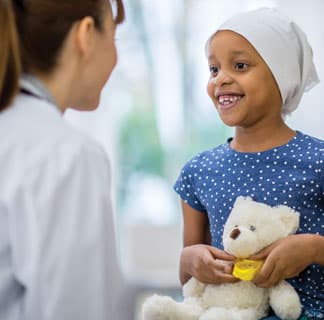‘She made it’: Preschooler beats acute lymphoblastic leukemia

Nikki Arseneau dreamed about the day for 2 ½ years.
It happened on Feb. 7, 2023.
Her daughter Joy, 5, rang the bell to mark the end of her treatment for acute lymphoblastic leukemia. Family members and staffers cheered and took videos as the bell clanged in the second-floor hallway of University Chicago Medicine Comer Children’s Hospital.
Nikki wept.
“I hugged my sister-in-law and I said, ‘She made it,’” Nikki said.
Joy is now cancer-free, but it was a long and difficult road.
The family's journey began in October 2020. Joy, then 3, ran a low-grade fever for two weeks. Medication didn't help, so Caroline Olaleye, MD, Joy’s pediatrician at UChicago Medicine at Ingalls - Flossmoor, ordered blood tests.
Olaleye called and directed Nikki and her husband, Jordan, to take Joy immediately to Comer’s emergency room. The child's platelet and red blood cell counts were dangerously low, and she had severe anemia.
“She told us, ‘Pack a bag and send (Joy’s brothers) to Grandma’s. And don’t Google anything!’” Nikki recalled.
More blood tests followed in the ER. Then pediatric oncologist Perry Morocco, MD, briefed the couple in private. Joy had leukemia, a type of blood and bone marrow cancer. The next steps: identify the type of leukemia and map out a treatment plan.
“When he left the room, Nikki grabbed me and said, ‘Am I awake? Am I dreaming? Is this really happening?’” Jordan said. “We were in shock that this would happen to our little girl. She never even had a cold before this. It was the worst day of our lives.”
Joy was diagnosed with acute lymphoblastic leukemia (ALL), the most common and treatable form of pediatric cancer. She fell into a “standard risk, favorable” category, meaning the prognosis was good.
However, she still needed to undergo a six-phase treatment that included 2 ½ years of chemotherapy. Her hair would fall out. She would have spinal taps, bone marrow biopsies, transfusions, and a port inserted into her chest. She would need to take steroids, which would cause mood and appetite swings. There would be regular doctor and hospital visits.
“This treatment is very much a marathon and not a sprint,” Morocco said.
An estimated 6,540 people in the U.S. are expected to be diagnosed with ALL in 2023, according to the Comer’s Childhood Cancer Survivors Center, where she’ll get support for any post-cancer issues or needs.
“Now she’s just a normal kid again,” said Nikki, adding that she'll start kindergarten this fall. “Despite everything she’s gone through and faced, she is her name.”
“She’s done wonderfully. She had a lot of courage,” Honhar added. “Her prognosis is great. I can’t wait to see pictures of her growing up.”
It happened on Feb. 7, 2023.
Her daughter Joy, 5, rang the bell to mark the end of her treatment for acute lymphoblastic leukemia. Family members and staffers cheered and took videos as the bell clanged in the second-floor hallway of University Chicago Medicine Comer Children’s Hospital.
Nikki wept.
“I hugged my sister-in-law and I said, ‘She made it,’” Nikki said.
Joy is now cancer-free, but it was a long and difficult road.
The family's journey began in October 2020. Joy, then 3, ran a low-grade fever for two weeks. Medication didn't help, so Caroline Olaleye, MD, Joy’s pediatrician at UChicago Medicine at Ingalls - Flossmoor, ordered blood tests.
Olaleye called and directed Nikki and her husband, Jordan, to take Joy immediately to Comer’s emergency room. The child's platelet and red blood cell counts were dangerously low, and she had severe anemia.
“She told us, ‘Pack a bag and send (Joy’s brothers) to Grandma’s. And don’t Google anything!’” Nikki recalled.
More blood tests followed in the ER. Then pediatric oncologist Perry Morocco, MD, briefed the couple in private. Joy had leukemia, a type of blood and bone marrow cancer. The next steps: identify the type of leukemia and map out a treatment plan.
“When he left the room, Nikki grabbed me and said, ‘Am I awake? Am I dreaming? Is this really happening?’” Jordan said. “We were in shock that this would happen to our little girl. She never even had a cold before this. It was the worst day of our lives.”
Joy was diagnosed with acute lymphoblastic leukemia (ALL), the most common and treatable form of pediatric cancer. She fell into a “standard risk, favorable” category, meaning the prognosis was good.
However, she still needed to undergo a six-phase treatment that included 2 ½ years of chemotherapy. Her hair would fall out. She would have spinal taps, bone marrow biopsies, transfusions, and a port inserted into her chest. She would need to take steroids, which would cause mood and appetite swings. There would be regular doctor and hospital visits.
“This treatment is very much a marathon and not a sprint,” Morocco said.
An estimated 6,540 people in the U.S. are expected to be diagnosed with ALL in 2023, according to the Comer’s Childhood Cancer Survivors Center, where she’ll get support for any post-cancer issues or needs.
“Now she’s just a normal kid again,” said Nikki, adding that she'll start kindergarten this fall. “Despite everything she’s gone through and faced, she is her name.”
“She’s done wonderfully. She had a lot of courage,” Honhar added. “Her prognosis is great. I can’t wait to see pictures of her growing up.”

Pediatric Cancer Care
All of our efforts are dedicated to helping kids and teens with cancer beat the disease, so they can live active, full lives.
Learn about our kid-focused cancer care